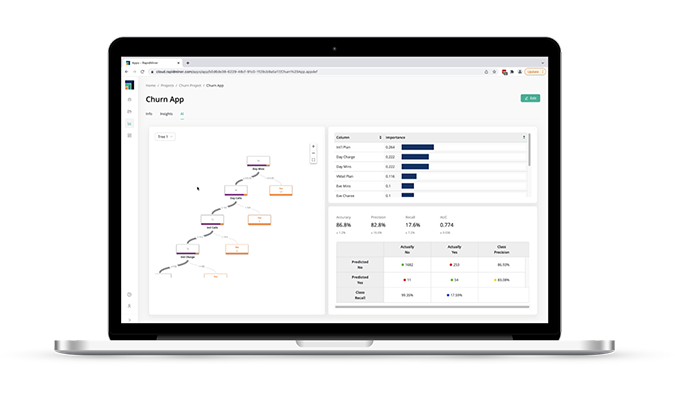
Artificial Intelligence (AI) and Data Analytics Solutions
Data is unlike any other asset your organization owns. It never wears out, it never drains, and it can be used repeatedly. But the value in data isn’t in having it, it’s in how you use it. Altair enables data-driven enterprises by providing teams the power to use AI and data analytics solutions to gain competitive advantages and drive next-level business results.
Empower Everyone to Foster a Data-Driven Culture
With Altair’s data analytics solutions, you can scale AI initiatives without requiring a big team of data scientists or expensive services engagements. Upskill your workforce so users from novice-level to expert can leverage the data and analytics tools needed to provide data-driven insights.
Deliver the Right Data and Advanced Analytics Tools
Provide the breadth and depth of data and analytics capabilities your diverse teams need to be successful. Whether that’s a unified, end-to-end data science solution, a self-service data transformation or visualization solution, or an alternative SAS language environment.
Extract data from PDFs, spreadsheets, and reports core to the business
Connect to databases, spreadsheets, big data, IoT and more
Explore trends and spot anomalies
Transform data to fit your application
Train and evaluate AI models, code-free to code-friendly
Operationalize models at scale
Develop real-time dashboards or end-user applications
Augment processes with automation, in the cloud or at the edge
Control end-user access to data
Altair RapidMiner delivers breadth and depth across the analytics lifecycle.
Learn MoreConquer Enterprise-Grade Challenges
Don’t let IT challenges get in the way of your data analytics solutions. Know that the scalability, extensibility, and deployment options you need are available—all without compromising the security or integrity of your data.
Ensure Security and Governance
Enforce oversight using fine-grained access control. Easily integrate with existing enterprise user management systems.
Deploy Anywhere
Flexible deployment models include hosted on-premises, cloud, or a hybrid solution.
Complement Tools of Today and Tomorrow
Evolve your analytics ecosystem. Bridge your current investments with your vision for the future.
Accelerate Innovation Across the Organization with AI
Tackle the high-impact AI use cases that will transform your business. By empowering everyone and delivering the right tools, there’s no limit to what you can achieve with data and advanced analytics tools.
Drive Revenue
- Demand forecasting
- Text mining
- Customer lifetime value
- Next best action
- Customer segmentation
- Up and cross-selling
Cut Costs
- Predictive maintenance
- Supply chain optimization
- Process automation
- Product development
- Churn prevention
- Automate data extraction
Manage Risk
- Credit scorecards
- Quality assurance
- Warranty analytics
- Disaster avoidance
- Regulatory compliance
- Fraud detection
- Cybersecurity
- Trade monitoring
Accelerate AI adoption in your organization with Frictionless AI.
Learn MoreFeatured Resources

50 Ways to Impact Your Business with AI
Identifying potentially impactful use cases is one of the most cited roadblocks for organizations seeking to leverage AI in their business. To complicate things further, best practices dictate that you should have a portfolio of use cases ready to experiment with. If finding one is a challenge, developing a whole portfolio of use cases may prove to be very difficult.
In this guide, we'll cover:
- A wide variety of AI applications for enterprises
- The challenges that led each business to seek help from AI & machine learning
- The advanced solutions that were built and deployed to overcome each challenge
- The documented financial impact experienced by each client

A Leader's Guide to Building a Data-Driven Culture
If you have mountains of data at your fingertips that you're not using, you risk falling behind your competition. But, if you actively work toward becoming a more data-driven organization and closing the pervasive data science skills gap, you can promote internal alignment around how data is used, make a tangible impact with AI, and come out on top. The best time to start optimizing how data is viewed and used at your organization is right now, and in this whitepaper, we're going to walk you through how to do just that.

Guide to Using Data Analytics to Prevent Financial Fraud
Financial fraud takes countless forms and involves many different aspects of business including; insurance and government benefit claims, retail returns, credit card purchases, under and misreporting of tax information, and mortgage and consumer loan applications.
Combating fraud requires technologies and business processes that are flexible in their construct, can be understood by all who are involved in fraud prevention, and are agile enough to adapt to new attacks without needing to be rebuilt from scratch. Armed with advanced data analytics, firms and government agencies can identify the subtle sequences and associations in massive amounts of data to identify trends, patterns, anomalies, and exceptions within financial transaction data. Specialists can use this insight to concentrate their attention on the cases that are most likely fraud.
This guide will help you understand the complex environment of financial fraud and how to identify and combat it effectively.

Make Machine Learning Work for You
Protecting consumers and enterprises involved in online transactions is just one example of how machine learning (ML) influences our daily lives. In fact, the list of use cases is already long, diverse and growing fast. The reason is clear – ML is a game-changing tool that enables organizations to make better decisions faster. What's more, ML is highly effective at balancing conflicting objectives.
Given the breadth and depth of potential use cases, one thing is clear – more and more people will find themselves working in environments where ML plays a critical role. And thanks to the emergence of low-code and no-code software, ML is no longer the exclusive preserve of programmers, data scientists, and people who paid attention in math class. More of us can, and will, be involved in developing and deploying practical ML solutions.
This eGuide will help you understand the key concepts behind ML, some common applications, and how ML becoming more useful to people at all levels of the modern organization.





